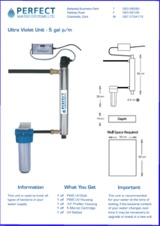What is a UV Water Purifier?
For many years chlorination has been the standard method of water disinfection in most water treatment plants. Recent studies have shown that water chlorination may be contributing to several environmental problems. Residual byproducts of chlorination can be toxic to aquatic life in downstream water. Some by-products of chlorination may be carcinogenic and may require removal in a drinking water treatment system. Also, it has been discovered that chlorination is much less effective in virus destruction than in killing bacteria.
Because of these problems with chlorination, consulting engineers, end-users and regulatory agencies are actively pursuing alternatives for water disinfection and has led to Ultraviolet light emerging as the leading candidate for water disinfection. Ultraviolet light (UV light) has the following inherent advantages over all other disinfection methods:
- No chemicals required
- Eliminates storage, transportation and handling, and potential safety hazards of chlorine.
- Low contact time – no contact basin is necessary and space requirements are minimal.
- No harmful by-products released.
- Minimum or no moving parts – high reliability.
- Low energy consumption
UV Lamps
Ultraviolet or UV disinfection virtually eliminates environmental and safety problems, and is cost-effective as well.
Ultraviolet disinfection of water employs low-pressure mercury lamps called UV Lamps or UV Lights. They generate short-wave ultraviolet in the region of 2537 Angstroms which is lethal to micro-organisms including bacteria, protozoa, viruses, molds, yeasts, fungi, nematode eggs, and algae. The mechanism of microorganism destruction is currently believed to be that ultraviolet causes molecular rearrangements in DNA and RHA, which in turn blocks replication.
UV lamps should be replaced at regular maintenance intervals otherwise an inadequate dose of radiant energy may result particularly if the water contains materials which absorb or prevent the light from reaching the bacteria, or if the quartz sleeve in the UV bulb becomes coated. Users of ultraviolet irradiation equipment should recognize the need for regular maintenance, including lamp replacement and cleaning. UV lamps are typically designed to operate for one year, during which time radiant output will progressively decrease.
The Perfect Water Range of UV Lamps and UV Filters
For farming and dairying applications, contact Perfect Water Systems in Charleville for a range of UV systems and UV replacement lamps at competitive prices. Call 1890-989098 now for more details or fill in the form below.

